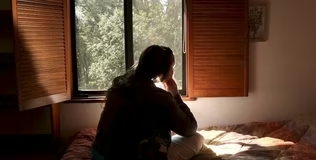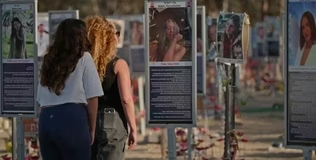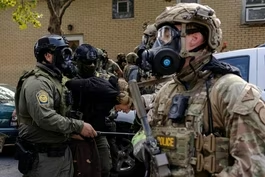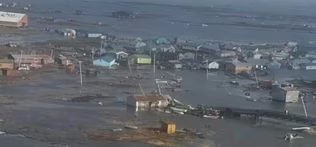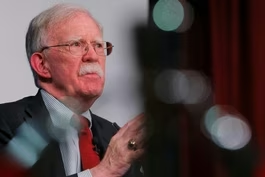
Trump weighs Venezuela land strikes following boat attacks
Clip: 10/16/2025 | 10m 20sVideo has Closed Captions
Trump weighs land strikes in Venezuela following attacks on suspected drug boats
The U.S. military destroyed a fifth boat in the Caribbean Sea this week that the Trump White House alleges carried narcotics bound for the U.S. Now, President Trump has raised the prospect of striking Venezuela on land. Amna Nawaz has two views on the actions from John Feeley and Sergio de la Pena.
Problems playing video? | Closed Captioning Feedback
Problems playing video? | Closed Captioning Feedback
Major corporate funding for the PBS News Hour is provided by BDO, BNSF, Consumer Cellular, American Cruise Lines, and Raymond James. Funding for the PBS NewsHour Weekend is provided by...

Trump weighs Venezuela land strikes following boat attacks
Clip: 10/16/2025 | 10m 20sVideo has Closed Captions
The U.S. military destroyed a fifth boat in the Caribbean Sea this week that the Trump White House alleges carried narcotics bound for the U.S. Now, President Trump has raised the prospect of striking Venezuela on land. Amna Nawaz has two views on the actions from John Feeley and Sergio de la Pena.
Problems playing video? | Closed Captioning Feedback
How to Watch PBS News Hour
PBS News Hour is available to stream on pbs.org and the free PBS App, available on iPhone, Apple TV, Android TV, Android smartphones, Amazon Fire TV, Amazon Fire Tablet, Roku, Samsung Smart TV, and Vizio.
Providing Support for PBS.org
Learn Moreabout PBS online sponsorshipAMNA NAWAZ: The U.S.
military destroyed another boat off the coast of Venezuela this week that the White House alleges was carrying narcotics bound for the U.S.
Both in his first term and his current one, the president and his team have made clear they want Venezuelan President Nicolas Maduro out of power.
And now Mr.
Trump has raised the prospect of striking Venezuela on land.
Off the coast of Venezuela, strike after strike in the Caribbean sea targeting small boats allegedly carrying illegal drugs and headed to the U.S., since early September, five such U.S.
military strikes, four of them on boats from Venezuela.
This week, an escalation.
DONALD TRUMP, President of the United States: We are certainly looking at land now, because we have got the sea very well under control.
AMNA NAWAZ: With President Trump confirming yesterday that the CIA is conducting covert operations inside Venezuela.
DONALD TRUMP: I authorized for two reasons, really.
Number one, they have emptied their prisons into the United States of America.
And the other thing are drugs.
We have a lot of drugs coming in from Venezuela.
And a lot of the Venezuelan drugs come in through the sea.
AMNA NAWAZ: It's an expansion of what the Pentagon has called a counternarcotics and counterterrorism mission, an armada of U.S.
warships already deployed off the Venezuelan coast and B-52 bombers to nearby international airspace.
NICOLAS MADURO, Venezuelan President: Not war, yes peace.
AMNA NAWAZ: A defiant President Nicolas Maduro responded to Trump's remarks yesterday.
NICOLAS MADURO (through translator): No to regime change.
No to CIA-orchestrated coup d'etat.
Latin America does not want them, does not need them, and repudiates them.
AMNA NAWAZ: In a statement, Venezuela's foreign minister said the escalation seeks to legitimize regime change with the ultimate aim of seizing Venezuela's oil resources.
For years, Venezuela's economy has been in freefall.
An estimated 80 percent of residents live in poverty, and nearly eight million people have fled Maduro's regime.
He was sworn in for his third term earlier this year, despite evidence he lost reelection by a landslide.
Just last week, one of Maduro's fiercest foes, Maria Corina Machado, won the Nobel Peace Prize.
The opposition leader, who lives in hiding, has spoken in favor of outside intervention in Venezuela.
After her win, Machado dedicated the prize to President Trump for his -- quote -- "decisive support of our cause."
Late today, Secretary of Defense Pete Hegseth announced that the Naval officer in charge of U.S.
operations for Latin America would leave by the end of 2025.
Admiral Alvin Holsey will end a 37-year career after less than a year in charge of U.S.
Southern Command.
No reason was given for his impending retirement.
Now we get two views on the Trump administration's actions against Venezuela.
John Feeley had a 28-year career in the Foreign Service, where he focused on Latin America and served as ambassador to Panama.
And Sergio de la Pena was deputy assistant secretary of defense for Western Hemisphere affairs during the first Trump administration.
He was the Army's attache to Venezuela in the 1990s and is a retired Army colonel.
Gentlemen, welcome to you both.
Thanks for joining us.
So, Ambassador Feeley, let me begin with you.
The news of President Trump confirming covert CIA operations in Venezuela, threatening military strikes on land inside a sovereign nation, what's your reaction to that?
JOHN FEELEY, Former U.S.
Ambassador to Panama: My reaction is that this is unfortunately more of the improvisational amateurism that we have kind of come to expect from the Trump administration's foreign policy.
I mean, first of all, let's stop and think, Amna, announcing a covert action.
That right there is kind of an oxymoron.
Why the president did it, I cannot explain.
The fact of covert CIA operations being recognized gives away any tactical element of surprise that it might have had.
And what it does do, however, is, it makes very clear that the pretext of a counternarcotics operation here really isn't what this is all about.
It's about regime change on the cheap.
AMNA NAWAZ: Colonel de la Pena, what do you make of that?
Is this about regime change in Venezuela for President Trump?
SERGIO DE LA PENA, Former U.S.
Assistant Secretary of Defense for Western Hemisphere Affairs: Well, I think President Trump has been very clear on his goals.
He says this is a counterdrug operation and this is also an operation to have the Venezuelans accept the immigrants that they have allowed to come into the United States.
He's made that very clear.
One of the other things he's also doing in the process is reestablishing deterrence that was seriously damaged in the previous administration.
We have got to have that deterrence.
And how he uses the tools at his disposal are up to the president.
AMNA NAWAZ: So, Colonel, are you saying these increased military actions, these are meant as a pressure tactic on Maduro to, as you say, accept deported Venezuelans and take actions on drug traffickers, has nothing to do with ousting Maduro?
SERGIO DE LA PENA: Well, there's a maximum pressure campaign to remove someone that has to be removed by the Venezuelan people who is an authoritarian, I would say, borderline totalitarian.
This gentleman is there illegally.
It was obvious in the last election that he lost by about 70 percent of the vote.
And so he has been there without the will of the Venezuelan people.
He is there illegally.
And so he is the head of an organization that's involved in criminal activities against the United States.
It's his stated policy to do anything in his power to be able to affect the United States from the inside, to include sending immigrants that can also cause problems.
And the stated policy in Venezuela that, if they can drown us in drugs, they're going to do that.
AMNA NAWAZ: Ambassador Feeley, we have even heard the opposition leader there, Maria Corina Machado, call publicly for greater U.S.
support to stop Maduro.
What do you make of this?
Does this justify further U.S.
intervention if it does lead to regime change?
JOHN FEELEY: Look, Amna, I agree completely with Sergio that Nicolas Maduro -- I will go beyond that.
He isn't a totalitarian leader.
He is an illegitimate president.
I think, however, that the United States should be pretty clear about its intentions.
If this really is a counternarcotics mission, then let's do it under the rule of law with counternarcotics.
If you really want to go in and do regime change, and that may not be the worst outcome for the Venezuelan people, an external invasion by the United States, but then let's not do it under the cover, a paper-thin cover of a counternarcotics mission, where you're schwacking a couple of boats and threatening that you're going to launch a few missiles in there.
Let's go get an authorized use of military force from the Congress.
And I think the reason they don't do that is because they know they don't have the support of the American people to do it.
There was a resolution under the war powers -- or war powers resolution that was brought in a bipartisan manner last week, and it was voted down 51-48.
But this is hotly debated.
America doesn't want another foreign war.
And so what they're doing is they're using this pretty pathetic pretext of going after drug traffickers, when their own DEA says that Venezuela is a drug trafficking country, make no mistake, but it is by no means trafficking the drugs that are killing Americans, which is fentanyl.
So this is the wrong force for the wrong mission under the wrong pretext.
AMNA NAWAZ: Can I just get both of you to briefly weigh in on this allegation we heard from Venezuelan officials that this is about the oil and seizing the oil reserves?
We know Venezuela is home to the largest known oil reserves.
Ambassador Feeley, what do you make of that?
And then, Colonel, I will come to you.
JOHN FEELEY: No, I don't believe this is about oil.
I don't believe the Trump administration would ever risk American blood and treasure just to get a commercial advantage.
I do believe that this responds to politics within the MAGA base that seeks to remove Nicholas Maduro.
AMNA NAWAZ: Colonel, what about you?
Venezuelan officials say it's about the oil.
Is it?
SERGIO DE LA PENA: No.
There's been oil companies that have been there the entire time that have never left, and there's at least one.
And, as John pointed out, there's two now that have licenses to take oil.
And Venezuela and the United States have had a very long history of collaboration in extracting oil from Venezuela.
AMNA NAWAZ: Gentlemen, if I can ask you.
If you had one line of advice to deliver to this president right now about how to proceed when it comes to Venezuela, what would that be?
John, to you first.
JOHN FEELEY: Be level with the American people.
Let's do this under the rule of law.
We know how to stop drugs under the rule of law.
It's U.S.
Code Title 21 and it's U.S.
Coast Guard interdiction.
Marco Rubio says that doesn't work, so we're just going to go ahead and blow them up.
You're cheapening the service of those Marines who are sitting off the coast, aren't going to invade and are just wasting time.
So be level with the American people.
Go to the Congress, get an authorized use of military force if what you want to do is punish Nicolas Maduro and give the Venezuelan people a chance.
But let's stop with the charade of announcing your own covert presidential findings and that this is a drug operation.
AMNA NAWAZ: Colonel, what's your line of advice for the president?
SERGIO DE LA PENA: My line of advice is keep up the pressure campaign on Mr.
Maduro.
He's an illegitimate president.
He's a criminal.
He is the head of a criminal cartel.
And the Venezuelan people need to remove him from his office.
AMNA NAWAZ: That's former Ambassador John Feeley and retired Colonel Sergio de la Pena joining us tonight.
Gentlemen, thank you so much for your time.
SERGIO DE LA PENA: Thank you, Amna.
It's a pleasure.
Abortion bans fueling rise in domestic violence, experts say
Video has Closed Captions
Clip: 10/16/2025 | 8m 54s | Abortion restrictions may be fueling a rise in domestic violence, experts warn (8m 54s)
How Israelis are working to process the trauma of Oct. 7
Video has Closed Captions
Clip: 10/16/2025 | 8m | How Israelis are working to process the collective trauma of the Oct. 7 attacks (8m)
News Wrap: Judge says ICE must wear body cameras in Chicago
Video has Closed Captions
Clip: 10/16/2025 | 6m 17s | News Wrap: Judge says immigration officers operating in Chicago must wear body cameras (6m 17s)
Rescue crews airlift hundreds out of rural Alaskan villages
Video has Closed Captions
Clip: 10/16/2025 | 7m 3s | Rescue crews airlift hundreds out of rural Alaskan villages after powerful storm (7m 3s)
Trump adviser turned critic John Bolton indicted
Video has Closed Captions
Clip: 10/16/2025 | 5m 41s | Trump adviser turned critic John Bolton indicted over handling of classified documents (5m 41s)
Young Republicans' hateful group chat sparks condemnation
Video has Closed Captions
Clip: 10/16/2025 | 5m 26s | Young Republicans' hateful group chat sparks bipartisan condemnation (5m 26s)
Providing Support for PBS.org
Learn Moreabout PBS online sponsorship
- News and Public Affairs

FRONTLINE is investigative journalism that questions, explains and changes our world.

- News and Public Affairs

Amanpour and Company features conversations with leaders and decision makers.












Support for PBS provided by:
Major corporate funding for the PBS News Hour is provided by BDO, BNSF, Consumer Cellular, American Cruise Lines, and Raymond James. Funding for the PBS NewsHour Weekend is provided by...
